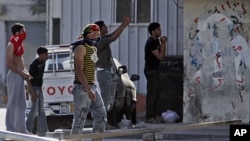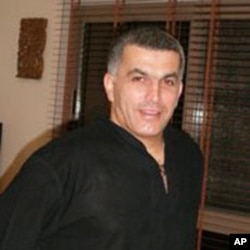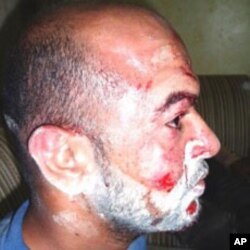Human rights groups are expressing concern about escalating crackdowns on Shi'ia protesters by the Sunni monarchy of Bahrain. Inspired by uprisings in Tunisia and Egypt, protesters took to the streets beginning February 14 to voice demands for reform and equal rights. At least 27 people are reported to have died and hundreds of people have been detained by security forces.
Nabeel Rajab is president of the Bahrain Center for Human Rights. VOA's Cecily Hilleary reached him by phone in Manama and asked him for an update.
|
Listen to Cecily Hilleary’s interview with Bahraini human rights activist Nabeel Rajab:
|
Hilleary: We are hearing reports of the arrests of doctors and nurses today and also of activists. What can you tell us about what is going on today in Bahrain?
Rajab: The situation is very critical. You have approximately one for every 1,000 citizens detained right now for political reasons. The Bahrain government, it seems, is going ahead in cracking down. Peaceful protesters were calling for democracy and [an] elected government with [a] constitution written by the people as they were inspired by other countries [which] gained democracy through revolutions.
Bahrainis thought that they, too, deserve to have democracy, an educated society, [a] society that has a culture, but unfortunately [the] Bahrain situation looks different than the others, because you have an army which is imported from the outside – from Pakistan, Jordan, Syria and Yemen. At the same time our government invited other troops – from Saudi Arabia, to deal with the peaceful protests.
So this is the situation we are facing. The protests were attacked completely. Villages were seized and surrounded by GCC (Gulf Cooperation Council) and [by the] Saudi army, and people were killed; thousands were injured, hundred were arrested. Hundreds of people are hiding. Hundreds of people were terminated from their work on a sectarian basis. Many salaries were cut and many students studying abroad were asked to come back, and their financial help was stopped – just because they have said they need to change [their] government or they want to have democracy or just because they participated in a protest outside [a Bahraini] embassy or inside Bahrain.
Things are pretty bad here in Bahrain. Over 400 people were detained here over the past two weeks.
Hilleary: You were once arrested. Based on your own experiences, what do you believe they are going through right now?
Rajab: Taking into consideration our history of human rights and seeing international human rights organizations reports in the past two years, we have [a] culture of torture, committing torture by our government. Bahrain is a very well-known country in practicing torture. Many international organizations have urged Bahrain to stop the systematic torture and urged the government to open an investigation into the systematic organized torture, but unfortunately the Bahrain government always ignores this.
So I would assume that most of those bloggers, most of those website administrators and human rights defenders are facing torture now and at least one man died [the day] before yesterday and he was imprisoned. And we believe strongly that he died because he was tortured by people interrogating him. So I am afraid that many bloggers and [those] who are active in the net - on Twitter and Facebook – are facing very hard times at this point in time.
Hilleary: And what about you – are you fearful of speaking out as you do?
Rajab: Arrests, harassments and intimidation will never stop an activist who believes in his work and believes in the importance of his work. I do believe in my work very much. I was arrested, as I told you, and I was beaten up, but that has encouraged me to do more activism, believing [that] this situation cannot continue. And this activism that we are doing – it has a cost. The cost might reach – it might be our life – but, you know, once we believe in our work, one I believe in my work, I am willing to see [through] the changes that I am fighting for.
Hilleary: You are speaking with the Voice of America. We have an audience in the Middle East, but also on Capitol Hill and within the administration. If you had a chance to give a message, what would it be?
Rajab: We would ask our American friends who believe in democracy and who believe in human rights – and that is the majority of Americans – we share the same values, we share the same principles. Human rights organizations in the United States are doing a great job. We ask them, we urge them, to look at our country to help our people, because we know that they respect what we are fighting for to help us by [putting pressure] on the administration to put pressure on the Bahraini government to stop its violence towards peaceful people who are calling for very legitimate rights guaranteed by international conventions, and we thank all these people in the United States who are with us now, who are supporting us, we appreciate their help and that will never be forgotten; it will always be appreciated by our people.






